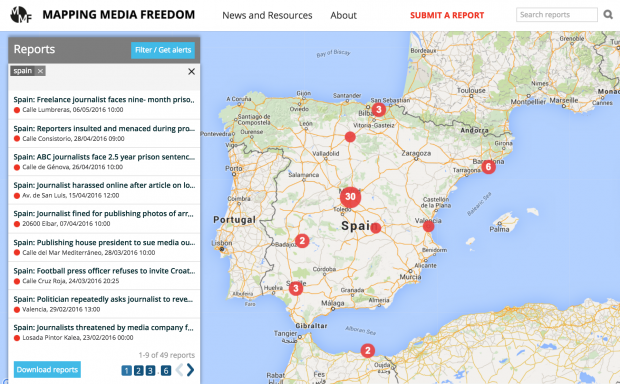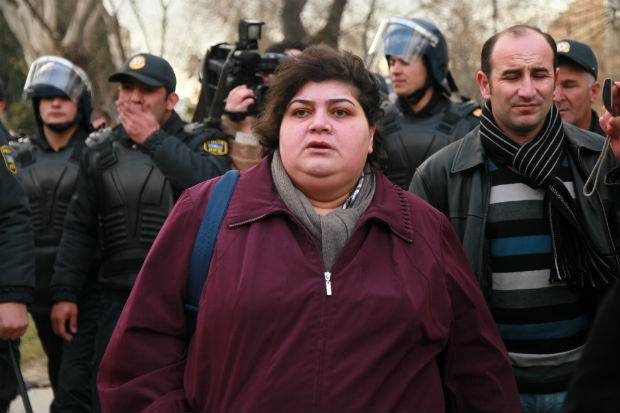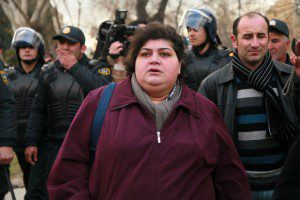27 May 2016 | Europe and Central Asia, Mapping Media Freedom, mobile, News and features, Spain

When Axier López, the 37-year-old reporter for the Basque-language magazine Argia, opened the mailbox at his home in Barakaldo early April, he discovered he’d become the first journalist in Spain to be punished under the Public Security Law.
He was ordered to pay €601 (£466) for photos of an arrest he published on Twitter without state permission on 7 March.
“It is a fine similar to a parking ticket,” López told Mapping Media Freedom. “Signed by a local government representative, it claims I committed a crime by putting on-duty police officers in danger.”
The photos in question were taken when López was in the city of Eibar covering the arrest of a woman who had previously refused to appear in court. In 2007 she had participated in a protest against the forced closure of a local youth organisation which the state and court linked to a Basque separatist terrorist group. The woman was accused of blocking a road.
The so-called “gag law” under which López was fined came into force on 1 June 2015. It bans coverage of on-duty police officers without prior police permission and prohibits the publication of any clue as to their identity. The Spanish centre-right government said the purpose of the law is to protect officer security.
“What is the problem if we track and inform the public about events involving police officers?” López asked. “Policemen are paid with public money, so I don’t see a problem if they appear in media content.”
“Almost every day you can see arrests of different people on TV, where police officers appear in front of the camera, but they punished only us,” he added.
Journalists in Spain have recently come under mounting legal pressures related to their work.
In April two journalists from the daily newspaper ABC, Pablo Muñoz and Cruz Morcillo, were facing two-and-a-half-year prison sentences for publishing a telephone conversation between members of the Italian mafia, who were talking about Luis Bárcenas, former treasurer of Partido Popular. After an avalanche of support for the journalists, the general attorney in Madrid dropped the charges in May.
The journalists had published their article in July 2014, a year after police investigators intercepted the phone conversation between two mafioso. The general attorney had claimed they revealed details of a secret police investigation.
“Charges, in this case, were really severe,” said Elsa González, president of the Spanish Federation of Journalist Associations (FAPE), the main journalist body in the country. “A journalist has to publish information if it’s in the public interest.”
González added that according to a poll by Madrid’s Association of Journalist (APM), last year only 23.2% of reporters with permanent contracts and 22.2% of freelancers said they never received pressure to modify information in their reports. APM said the pressure could come from multiple angles, including political and corporate powers, public institutions and advertisers.
A group of Spanish media companies has also recently been threatened with legal action after online newspapers El Confidencial and Eldiario.es, along with private TV channel La Sexta reported that Juan Luís Cebrián, president of the Prisa media group, publisher of the national newspaper El País and sports daily AS, appeared in the Panama Papers.
On 26 April Prisa issued a statement on its website stating that its president had taken legal action against the outlets for “clear defamatory intent” by linking Cebrián to the Panama Papers “in which he categorically does not appear”.
The centre-right daily newspaper El Mundo, a competitor of Prisa’s left-leaning daily El País, then reported that journalists who work for Prisa publishing house were prohibited from engaging with the three media outlets.
Nacho Cardero, director of El Confidencial, told Mapping Media Freedom that Cebrián has yet to take any formal action.
“At the moment there are no actions against any of the three media sources and furthermore, the intention to expel contributors of El Confidencial, La Sexta or Eldiario.es from his group, hasn’t occurred,” said Cardero. “However, Prisa has closed the door to Ignacio Escolar, director of Eldiario.es.”
López believes all these cases serve to spread fear among journalists. Meanwhile, his appeal against his fine has been refused. It could have been reduced to €300 (£232) if he had paid in 15 days. “However, we are not going to pay because we were doing our job,” he said.
“I don’t know where we can go in the legal process,” López added. “But it is important that the debate on this law is open and that we resist in order to prevent possible fear in other journalists.”
Mapping Media Freedom approached Cebrián for comment but received no response.
26 May 2016 | Azerbaijan, Azerbaijan Statements, Campaigns, Campaigns -- Featured, Europe and Central Asia, mobile, Statements

Khadija Ismayilova is one of the government critics jailed ahead of the 2015 Baku European Games.
Index on Censorship calls for all Khadija Ismayilova’s convictions to be quashed following the reduction in her jail sentence to a three-and-a-half-year suspended term.
Ismayilova, an award-winning journalist, was imprisoned since December 2014 and sentenced in September 2015 to seven-and-a-half years in prison on trumped-up charges.
“Khadija is a courageous journalist who speaks truth to power despite relentless harassment and pressure,” said Index on Censorship’s senior advocacy officer Melody Patry. She added: “Her imprisonment was unjust and the Supreme Court should have gone further and overturned the conviction rather than merely reducing the sentence.”
Officially charged with large-scale misappropriation and embezzlement, illegal entrepreneurship, tax evasion and abuse of official duties, the real reason for Ismayilova’s imprisonment is her investigative journalism and advocacy.
Although Ismayilova is out of jail, her conviction still stands and carries many restrictions on her freedoms. She will have to report herself to the police every month and won’t be able to leave the country for five years without a permission from state institutions, Azadliq Radiosu reports.
“The struggle is not over for Khadija Ismayilova, and it is certainly not over for the remaining political prisoners in Azerbaijan,” Index’s CEO Jodie Ginsberg said. “Substantial change and reform are needed so that the authorities cannot jail and free their critics as they please.”
Index on Censorship will take part in the Sport for Rights global action to mark Ismayilova’s 40th birthday on Friday 27 May. Gatherings across the globe will go ahead, and participants will celebrate Ismayilova’s release and call for the release of the country’s dozens of remaining political prisoners.
Azerbaijan: Journalist Khadija Ismayilova released from prison
Who is investigative journalist Khadija Ismayilova?
25 May 2016 | Azerbaijan, Europe and Central Asia, mobile, News and features

Khadija Ismayilova
Azerbaijan’s Supreme Court has ordered the release of investigative journalist Khadija Ismayilova after an international campaign to free her and just two days before international protests against her detention were due to take place.
Khadija, who turns 40 on Friday, had previously been sentenced to seven-and-a-half years in prison on trumped-up financial charges in September 2015, having been detained since December 2014. The supreme court has just announced that her sentence has been reduced to a suspended three-year sentence. She will be subject to a travel ban and other restrictions.
“We are delighted that Khadija Ismayilova has been released from prison,” said Index’s senior advocacy officer Melody Patry. “She shouldn’t have spent a day in jail. The charges against her were spurious and we call for her full acquittal. We also reiterate our calls for Azerbaijan to release all political prisoners.”
Ismayilova was jailed in December 2014 on a range of politically motivated charges – initially inciting someone to attempt suicide, and later the charges of which she was eventually convicted: illegal entrepreneurship, tax evasion, and abuse of office. The real reason she was targeted, however, was her investigative reporting exposing corruption among Azerbaijan’s ruling elite.
Eastern Europe, Caucasus and Central Asia (ECCA) International Media Support team leader Gulnara Akhundova said today: “We are beyond relieved that Khadija Ismayilova has finally been released, but emphasise that she should never have spent a single day in jail. We call for all restrictions on her to be immediately dropped and for her conviction to be overturned.”
Rebecca Vincent of Sports for Rights, which has been campaigning for Ismayilova’s release, said: “We are delighted that Khadija is finally free, after spending 537 days unjustly jailed. On the occasion of her release, we echo Khadija’s call that we should not focus only on her case, but call for the releases of all political prisoners and concrete steps to address the rampant corruption and human rights abuses in Azerbaijan that Khadija has sacrificed so much to expose.”
Sport for Rights has organised a global action to mark Ismayilova’s 40th birthday on Friday 27 May in 40 cities around the world. Gatherings will still go ahead, and participants will celebrate Ismayilova’s release, call for her full acquittal and call for the release of the country’s dozens of remaining political prisoners.
Index on Censorship senior advocacy officer Melody Patry is available for comment at +44 (0)207 963 7290 / [email protected].
Sport for Rights coordinator Rebecca Vincent is available for comment at +44 (0)7583 137751 / [email protected].
25 May 2016 | Azerbaijan, Azerbaijan News, Europe and Central Asia, mobile, News and features
 Azerbaijan’s Supreme Court has ordered the release of investigative journalist Khadija Ismayilova. But who is Ismayilova and why was she in prison?
Azerbaijan’s Supreme Court has ordered the release of investigative journalist Khadija Ismayilova. But who is Ismayilova and why was she in prison?
One of Azerbaijan’s most celebrated journalists, Ismayilova investigated, among other things, Azerbaijan’s human rights abuses and the corruption involving the family of president Ilham Aliyev. The recent Panama Papers have followed up on her work, exposing links between the president’s family and a network of offshore tax havens and hidden wealth.
Ismayilova was arbitrarily imprisoned in December 2014 and was sentenced in September 2015 to seven-and-a-half years in prison. Although she is officially charged with large-scale misappropriation and embezzlement, illegal entrepreneurship, tax evasion and abuse of official duties, it is widely believed that the real reason for Ismayilova’s imprisonment is her investigative journalism.
Before her arrest, Ismayilova had been subjected to a relentless campaign of intimidation and persecution, possibly orchestrated by the Azerbaijani authorities to discredit her investigative reporting on corruption amongst the highest levels of society.
“Khadija Ismayilova has suffered a serious invasion of her personal privacy through the installation of hidden cameras and wires in her flat and publication of secretly filmed videos among other incidents. Azerbaijan has a positive obligation to carry out an effective investigation into these violations,” said Camila Graham-Wood, legal officer at Privacy International.
Human rights lawyer Amal Clooney has been representing Ismayilova during her case at the European Court of Human Rights.
Her work was recognised by the United Nations which awarded her the prestigious Unesco/Guillermo Cano World Press Freedom Prize. When Ismayilova was in prison, her mother, Elmira Ismayilova, accepted the award on her daughter’s behalf. She read a statement Ismayilova wrote from prison: “As you gather here tonight, I ask you not to laud my work or my courage, but to dedicate yourself to the work each one of you can do on behalf of press freedom and justice.”
She read a statement Ismayilova wrote from prison: “As you gather here tonight, I ask you not to laud my work or my courage, but to dedicate yourself to the work each one of you can do on behalf of press freedom and justice.” Ljiljana Zurovac, president of the Unesco/Guillermo Cano World Press Freedom Prize 2016 jury, said: “Khadija Ismayilova highly deserves the prize and I am happy to see that her courage and professionalism are recognised.”
Azerbaijan is one of the lowest ranked countries for press freedom, being placed 163 out of 180 countries on the 2016 Reporters Without Border’s World Press Freedom Index.
Protests due to take place this Friday to mark Ismayilova spending her 40th birthday in prison will still go ahead to celebrate her release, call for her full acquittal and for the release of the country’s political prisoners, including Ilgar Mammadov, Seymur Hezi and Ilkin Rustemzade.




 Azerbaijan’s Supreme Court has
Azerbaijan’s Supreme Court has